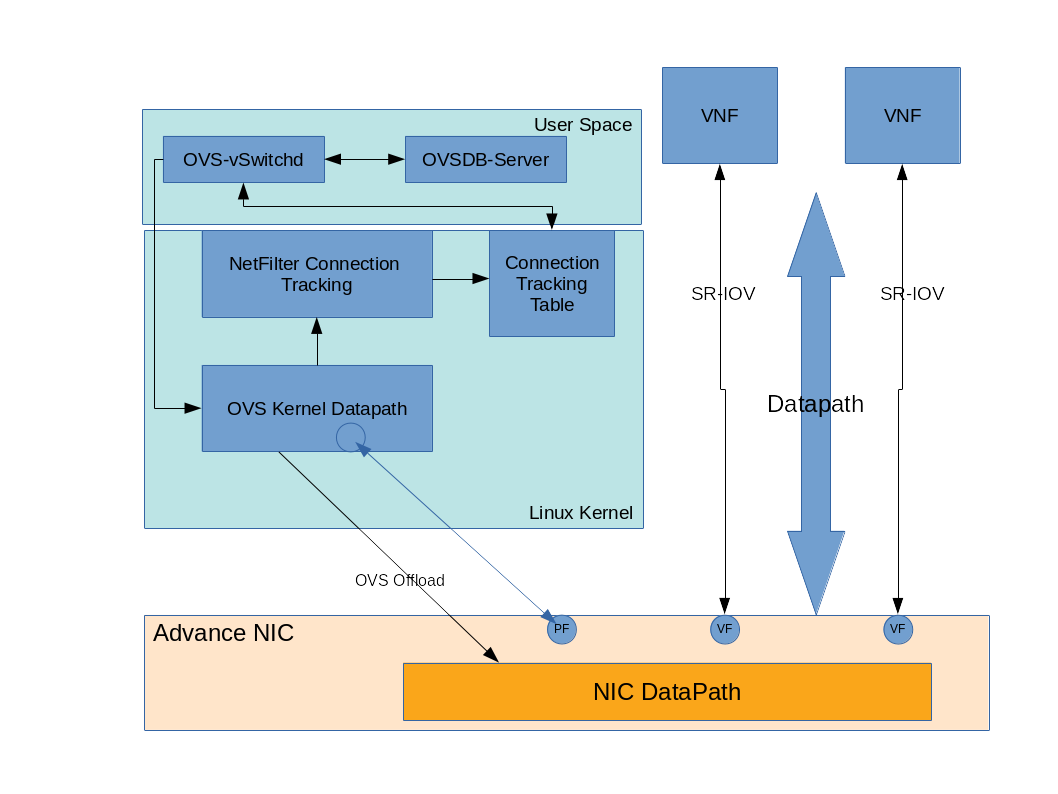SR-IOV with OVS Hardware Offload validation and supportibilty for TC offloading
Defining the Architecture
- In this example, the SRIOV with OVS hardware offloading compute node validated with Mellanox Connentx4 LX PCI card.
SRIOV with OVS Hardware Offload validation
-
Post-deployment, from the compute node, verify OpenvSwitch enabled with hardware offload flag and ensure PF enabled with switchdev mode and bind with VFs.
Example:
# ovs-vsctl -t 5 get Open_vSwitch . other_config {hw-offload="true"}$ /usr/sbin/devlink dev eswitch show pci/0000:03:00.0 pci/0000:03:00.0: mode switchdev inline-mode transport encap enable$ cat /sys/class/net/ens2f0/device/sriov_numvfs 4$ grep ^[^#] var/lib/config-data/puppet-generated/nova_libvirt/etc/nova/nova.conf | grep passthrough_whitelist passthrough_whitelist={"devname":"ens2f0","physical_network":"datacentre"} -
Ensure the neutron ports should create with a switchdev binding profile like below example.
# openstack port create --network <network-name> --vnic-type=direct --binding-profile '{"capabilities": ["switchdev"]}' <neutron-port-name>$ openstack port show <neutron-port-name> +-----------------------+--------------------------------------------------------------------------------------------------------------------+ | Field | Value | +-----------------------+--------------------------------------------------------------------------------------------------------------------+ | admin_state_up | UP | | allowed_address_pairs | | | binding_host_id | overcloud-compute-0.localdomain | | binding_profile | capabilities='[u'switchdev']', pci_slot='0000:03:00.2', pci_vendor_info='15b3:1016', physical_network='datacentre' | | binding_vif_details | datapath_type='system', ovs_hybrid_plug='False', port_filter='True' | | binding_vif_type | ovs | | binding_vnic_type | direct | <..trim..> | mac_address | aa:aa:aa:aa:aa:aa | <..trim..> +-----------------------+--------------------------------------------------------------------------------------------------------------------+# ip link show ens2f0 6: ens2f0: <BROADCAST,MULTICAST,UP,LOWER_UP> mtu 9000 qdisc mq master ovs-system state UP mode DEFAULT group default qlen 1000 link/ether bb:bb:bb:bb:bb:bb brd ff:ff:ff:ff:ff:ff promiscuity 1 vf 0 MAC aa:aa:aa:aa:aa:aa, vlan 797, spoof checking off, link-state enable, trust off, query_rss off <..trim..> -
The neutron port should bind with OpenvSwitch integretion bridge (br-int) with sudo name (e.g., eth0, eth1, eth2) and PF (e.g., ens2f0) bind with provider bridge (e.g., br-data).
Example:# ovs-vsctl show Manager "ptcp:6640:127.0.0.1" is_connected: true Bridge br-int Controller "tcp:127.0.0.1:6633" is_connected: true fail_mode: secure Port "eth1" tag: 2 Interface "eth1" <..trim> Port "eth0" tag: 2 Interface "eth0" Bridge br-data Controller "tcp:127.0.0.1:6633" is_connected: true <..trim..> Port "ens2f0" Interface "ens2f0" Port br-data Interface br-data type: internal ovs_version: "2.9.0" -
Review OpenvSwitch port details in data path layer.
Example:
# ovs-dpctl show system@ovs-system: lookups: hit:7546 missed:87300 lost:0 flows: 6 masks: hit:114758 total:4 hit/pkt:1.21 port 0: ovs-system (internal) port 1: br-data (internal) port 2: ens2f0 port 3: br-int (internal) port 4: eth0 port 5: eth1 port 6: eth2
Supportability for TC offloading
-
Currently, TC offloading may is not fully supported and everything is related to connection tracking is not offloadable.
Below reference journal logs.Mar 28 06:02:15 overcloud-computesriov-0 ovs-vsctl[36637]: ovs|00001|vsctl|INFO|Called as /usr/bin/ovs-vsctl set Open_vSwitch . other_config:hw-offload=true Mar 28 06:02:15 overcloud-computesriov-0 kernel: TECH PREVIEW: TC offloading may not be fully supported. Please review the provided documentation for limitations. -
If ML2-OVS configured with openvswitch firewall driver and neutron port of VM enable with the security group, then ovs-vswitchd log flooded with below error message and during traffic communication, the flow related to VF not getting offloaded to PF.
2019-03-29T07:18:32.156Z|142248|ofproto_dpif_xlate(handler27)|DBG|bridge br-int: learned that ff:ff:ff:ff:ff:ff is on port eth0 in VLAN 1 2019-03-29T07:18:32.156Z|142249|ofproto_dpif_xlate(handler27)|DBG|bridge br-data: learned that ff:ff:ff:ff:ff:ff is on port phy-br-data in VLAN 111 2019-03-29T07:18:32.156Z|142250|netdev_tc_offloads(handler27)|DBG|offloading attribute ct_state isn't supported 2019-03-29T07:18:32.156Z|142251|dpif_netlink(handler27)|ERR|failed to offload flow: Operation not supportedNote: There is downstream bugzilla 1694545 track for move the
ERRtrace toWARN.# ovs-dpctl dump-flows type=offloaded in_port(2),eth(src=dd:dd:dd:dd:dd:dd,dst=ce:ce:ce:ce:ce:ce),eth_type(0x88cc), packets:0, bytes:0, used:4.840s, actions:drop in_port(2),eth(src=dd:dd:dd:dd:dd:dd,dst=ab:ab:ab:ab:ab:ab),eth_type(0/0xffff), packets:0, bytes:0, used:1.070s, actions:drop -
For the workaround to offload all flows, currently it is recommended to disable the security group
--disable-port-securitywhile creating the OpenStack network.usage: openstack network create [-h] [-f {json,shell,table,value,yaml}] [-c COLUMN] [--max-width <integer>] [--fit-width] [--print-empty] [--noindent] [--prefix PREFIX] [--share | --no-share] [--enable | --disable] [--project <project>] [--description <description>] [--mtu <mtu>] [--project-domain <project-domain>] [--availability-zone-hint <availability-zone>] [--enable-port-security | --disable-port-security] [--external | --internal] [--default | --no-default] [--qos-policy <qos-policy>] [--transparent-vlan | --no-transparent-vlan] [--provider-network-type <provider-network-type>] [--provider-physical-network <provider-physical-network>] [--provider-segment <provider-segment>] [--tag <tag> | --no-tag] <name> -
Once the security group disabled for neutron port, then the all associated flow get offloaded during traffic communication.
# ovs-dpctl dump-flows type=offloaded in_port(2),eth(src=dd:dd:dd:dd:dd:dd,dst=ab:ab:ab:ab:ab:ab),eth_type(0/0xffff), packets:0, bytes:0, used:8.260s, actions:drop in_port(5),eth(src=aa:aa:aa:aa:aa:aa,dst=cc:cc:cc:cc:cc:cc),eth_type(0x0800),ipv4(frag=no), packets:12, bytes:1176, used:0.990s, actions:4 in_port(5),eth(src=aa:aa:aa:aa:aa:aa,dst=cc:cc:cc:cc:cc:cc),eth_type(0x0806), packets:1, bytes:60, used:7.260s, actions:4 in_port(4),eth(src=cc:cc:cc:cc:cc:cc,dst=aa:aa:aa:aa:aa:aa),eth_type(0x0800),ipv4(frag=no), packets:12, bytes:1176, used:0.990s, actions:5 in_port(4),eth(src=cc:cc:cc:cc:cc:cc,dst=aa:aa:aa:aa:aa:aa),eth_type(0x0806), packets:0, bytes:0, used:8.780s, actions:5



Comments